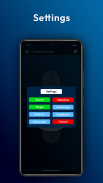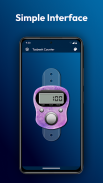








Tally Counter
Tasbih, Tasbeeh

Description of Tally Counter: Tasbih, Tasbeeh
Tally Counter: Tasbih, Tasbeeh is a counting application designed for individuals seeking to keep track of their recitations in Islamic practice. This app is especially useful for performing dhikr, a form of remembrance of Allah, through the recitation of specific phrases or names. Available for the Android platform, users can easily download Tally Counter: Tasbih, Tasbeeh to enhance their spiritual routines.
The interface of Tally Counter: Tasbih, Tasbeeh is user-friendly and straightforward, allowing users to navigate the app with ease. Upon opening the app, individuals are greeted with a clean layout that focuses on functionality. The main screen displays the count, providing a clear view of the number of recitations completed. This simplicity is beneficial for users who may not be technologically savvy, as it minimizes distractions and emphasizes the primary purpose of the app.
One of the app's primary functions is its accurate counting mechanism. Users can increment the count with a single tap, ensuring that they do not lose track of their recitations. This feature is particularly advantageous during longer sessions of dhikr, where maintaining an accurate count can become challenging. The app eliminates the need for physical prayer beads, offering a modern and convenient alternative for those who prefer digital tools.
Tally Counter: Tasbih, Tasbeeh also allows for customization, enabling users to set specific targets for their recitations. Individuals can define goals that align with their personal spiritual practices, fostering a sense of achievement as they reach these milestones. This feature encourages consistency in practice and can motivate users to engage more regularly in their religious observance.
The app supports multiple counting modes, catering to various preferences and practices. Users can switch between different modes based on their needs, whether they are focusing on a single type of recitation or tracking multiple phrases simultaneously. This flexibility ensures that the app can adapt to the diverse practices of its users.
Another important aspect of Tally Counter: Tasbih, Tasbeeh is its ability to provide a history of counts. Users can review their past recitations, which can be beneficial for reflection and personal growth. This tracking feature enables individuals to see their progress over time, fostering a deeper connection to their spiritual journey. By being able to look back at their recitation history, users may find encouragement to continue their practice.
For those who appreciate visual aids, the app includes customizable themes and colors. Users can select a theme that resonates with them, enhancing their overall experience while using the app. This personalization aspect allows for a greater sense of ownership over the app, making the practice feel more intimate and tailored to individual preferences.
Notifications can also be set within Tally Counter: Tasbih, Tasbeeh to remind users to engage in their recitation practices. These reminders can help integrate dhikr into daily routines, ensuring that users remain committed to their spiritual goals. By receiving timely prompts, individuals may be more likely to allocate time for reflection and remembrance in their busy schedules.
In addition to its practical features, Tally Counter: Tasbih, Tasbeeh promotes mindfulness through its design and functionality. The app encourages users to focus on the meaning of their recitations rather than merely counting. By providing a distraction-free environment, individuals can engage more deeply with their dhikr, fostering a more meaningful connection to their faith.
The app is designed to be lightweight, ensuring that it does not consume excessive storage space on devices. This efficiency is advantageous for users who may have limited storage capacity, allowing them to maintain the app without sacrificing other important applications. Furthermore, the app operates smoothly, providing a seamless experience without lag or interruptions.
Tally Counter: Tasbih, Tasbeeh stands out for its practical approach to a traditional practice. By merging modern technology with spiritual observance, the app offers a unique solution for individuals seeking to enhance their dhikr experience. Users can download Tally Counter: Tasbih, Tasbeeh to explore its features and incorporate it into their daily practices.
Through its user-centric design, the app effectively meets the needs of those engaging in tasbih. The combination of accurate counting, customization options, and historical tracking creates a comprehensive tool for spiritual reflection. Users can appreciate the balance between functionality and mindfulness, aligning their counting practices with their personal beliefs and goals.
Tally Counter: Tasbih, Tasbeeh serves as an effective resource for anyone looking to deepen their engagement in Islamic practices. With its straightforward features and adaptable options, it supports individuals in their journey of remembrance and reflection within their faith.
























